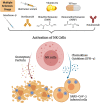Drugs for Multiple Sclerosis Activate Natural Killer Cells: Do They Protect Against COVID-19 Infection?
- PMID: 33061471
- PMCID: PMC7519863
- DOI: 10.2147/IDR.S269797
Drugs for Multiple Sclerosis Activate Natural Killer Cells: Do They Protect Against COVID-19 Infection?
Abstract
COVID-19 infection caused by the newly discovered coronavirus severe acute respiratory distress syndrome virus-19 (SARS-CoV-2) has become a pandemic issue across the globe. There are currently many investigations taking place to look for specific, safe and potent anti-viral agents. Upon transmission and entry into the human body, SARS-CoV-2 triggers multiple immune players to be involved in the fight against the viral infection. Amongst these immune cells are NK cells that possess robust antiviral activity, and which do not require prior sensitization. However, NK cell count and activity were found to be impaired in COVID-19 patients and hence, could become a potential therapeutic target for COVID-19. Several drugs, including glatiramer acetate (GA), vitamin D3, dimethyl fumarate (DMF), monomethyl fumarate (MMF), natalizumab, ocrelizumab, and IFN-β, among others have been previously described to increase the biological activities of NK cells especially their cytolytic potential as reported by upregulation of CD107a, and the release of perforin and granzymes. In this review, we propose that such drugs could potentially restore NK cell activity allowing individuals to be more protective against COVID-19 infection and its complications.
Keywords: COVID-19; NK cells; multiple sclerosis.
© 2020 Al-Ani et al.
Conflict of interest statement
The authors declare that the work was conducted in the absence of any commercial or financial relationships that could be construed as a potential conflict of interest. The authors report no conflicts of interest for this work.
Figures
References
-
- GISAID Global Initiative on Sharing All Influenza Data. Phylogeny of SARS-like betacoronaviruses including novelcoronavirus (nCoV). Available from: https://nextstrain.org/groups/blab/sars-like-cov.
Publication types
LinkOut - more resources
Full Text Sources
Miscellaneous


